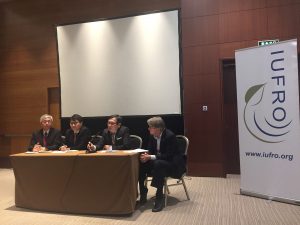Panel discussion at the IUFRO Regional Congress for Asia and Oceania, moderated by Peter Mayer, Austrian Research Center for Forests (BFW) and Deputy Coordinator of IUFRO Directors’ Forum
Panelists:

Panelists at the Directors’ Forum
Haruo Sawada, Forestry and Forest Products Research Institute (FFPRI), Japan
Jung-Hwan Park, National Institute of Forest Science (NIFoS), Korea
Gan Kee Seng, Forest Research Institute (FRIM), Malaysia
Jerry Vanclay, School of Environment, Science and Engineering, Southern Cross University, Australia
The IUFRO Directors’ Forum is one of the most important activities within IUFRO and its status of a Special Program reflects this great importance. The forum is a high-level platform for directors of forest research institutions and deans of forest faculties worldwide to debate opportunities and challenges of research management.
In his opening remarks, IUFRO President Mike Wingfield underlined the need for research managers to guide the process of thinking on what the future of forests, forestry and forest-related education should look like. He also pointed out that in the region of Asia and Oceania IUFRO has approximately 170 member organizations. Thus, about one quarter of IUFRO Membership is from this region, which makes a meeting of research managers here in Beijing all the more relevant.
To set the stage for the panel discussion, Professor Chu Fuxiang, Vice President of the Chinese Academy of Forestry (CAF), gave a very concise and comprehensive overview of the organization of research management in China. He particularly referred to the steps that CAF had taken towards putting in place the necessary infrastructure for basic and applied forest-related research as well as strategic high-tech research. In order to address the challenges of the future, great efforts are being made to strengthen research in newly developed forest disciplines such as forests as carbon sinks, biomass for energy, biomass for materials, and forests for developing biological medicines.
Magdalena Lackner, IFSA/BFW, presented the results of an IUFRO survey on developments in forest research management. The survey showed a clear tendency towards giving more generic names to institutions, which in many cases implies the elimination of the words forests or forestry in the names. There have also been noticeable changes in current and future research priorities mainly towards topics related to climate change and global social changes. This shift goes hand in hand with a greater need to increase public awareness of the global challenges and improve communication between science and policy. Finally, changes in the funding base are obviously having a decisive impact on the work of research institutions worldwide.
These trends and changes were addressed in the following panel debate where all four panelists outlined the situations and experiences in their countries – Japan, Korea, Malaysia, and Australia – and institutions. During the discussion with the audience it became quite obvious that most of the research institutions in the region and also in other parts of the worldare facing similar challenges.
Name changes and mergers with broader entities are quite frequent; a clear shift from traditional forest disciplines to new topics such as biomass, human health, and climate change is taking place; and government funds are often cut while at the same time competitive funding options from private industry are being explored. Of course, not all countries in the region are affected in the same way. Research institutions in China and Korea, in particular, still receive strong governmental support and even witness increases in budgets, whereas in many other countries governmental support is being reduced. Jung-Hwan Park from Korea explains that in his country the positive budget situation reflects “the awareness that forests provide major benefits for people and the need of the forest research sector to meet social, industrial and also governmental demands.”
In order to increase the level of awareness of the benefits of forests among policymakers and the public it has become crucial for forest research to translate the research results to the policy makers. “We should put our results to the policy makers and need staff to transfer results to real policy” explains Haruo Sawada from Japan. Directors of institutions are now more influenced by politicians that ask for short-term political outcome.Towards this end, “We must define the added value of our research products more clearly and communicate it to policy, industry and society” Gan Kee Seng from Malaysia confirms.
As a consequence, however, it seems that the long-term perspective and the holistic management skills are gradually being lost. Also, politicians often think that research output is enhanced by restructuring and renaming institutions. However, as Jerry Vanclay from Australia points out, “it is not about the structure and name under which we arrange our research, it is about creating an inspirational environment where researchers feel comfortable and encouraged to do research at their best.”
IUFRO President Mike Wingfield concludes by remarking that in research management “we are often much too focused on micro-managing researchers. More flexibility is important, also when it comes to research funding!”
Photo of panel:
Panelists from left to right (photo)
Haruo Sawada, Forestry and Forest Products Research Institute (FFPRI), Japan
Jung-Hwan Park, National Institute of Forest Science (NIFoS), Korea
Gan Kee Seng, Forest Research Institute (FRIM), Malaysia
Jerry Vanclay, School of Environment, Science and Engineering, Southern Cross University, Australia

Leave a Reply